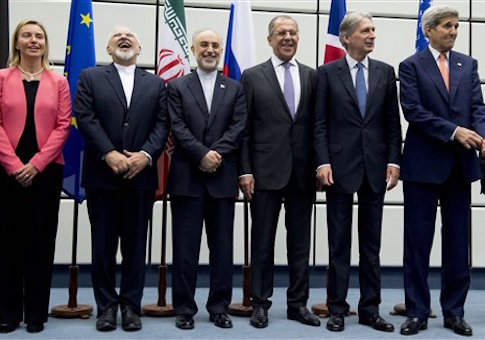Iran and world powers on Tuesday announced they had sealed a final nuclear deal with Tehran that will lift most economic sanctions on the country and permit it to continue many of the most controversial aspects of its nuclear program, as well as its missile development, according to initial text of the agreement and statements by diplomats.
The agreement, which was finalized in Vienna, would lift international sanctions on Iran and permit it to continue key elements of its nuclear work, as well as research and development.
Iran will be permitted to continue spinning centrifuges, which are used to enrich uranium, the key component in a nuclear weapon. Western powers will also work with Iran to help it install and operate more advanced centrifuges, according to those apprised of the deal.
This concession—as well as a range of others made by the United States—has rattled analysts and lawmakers, who have maintained that Iran should not be permitted to retain the core aspects of a nuclear program.
Sanctions also will be lifted on Iran, including those on the country’s banks and financial sectors, which have long supported Iran’s nuclear program as well as its sponsorship of international terrorist groups.
In one of the most controversial concessions made by the Obama administration, a United Nations embargo on arms will also be lifted within around five years as part of the deal, according to multiple reports. A similar embargo on the construction of ballistic missiles, which could carry a nuclear payload, also will expire in around eight years under the deal.
Initial readings of the deal also indicate that Iran will be given the right to veto so-called "anywhere, anytime" inspections of Iranian nuclear sites. This concession has caused concern that Tehran will be able to continue hiding its nuclear work and potentially continue in secret along the pathway to a bomb.
Iran also will be permitted for a time to keep its military sites off limits to inspectors, who have long been unable to confirm the past dimensions and scope of Iran’s nuclear weapons work.
New resolutions by the U.N. Security Council will solidify most key aspects of the deal.
Initial Iranian state-controlled reports on the final text of the agreement claim that "the world powers recognize Iran’s civilian nuclear program, including the country’s right to the complete nuclear cycle."
In addition, "none of the Iranian nuclear facilities will be dismantled or decommissioned" under the deal, according to Iran’s Fars News Agency.
As part of a sanctions relief package, "tens of billions of dollars in Iranian revenue frozen in foreign banks will be unblocked" and returned to the Islamic Republic.
In public comments before the sides entered a closed-door meeting to finalize the deal, Iranian Foreign Minister Javad Zarif described the deal as a "win-win solution to what in our view was an unnecessary crisis."
"This is a historic moment," Zarif said, calling the final deal "an agreement that is not perfect for anybody."
"Now we are starting a new chapter of hope," he added.
Secretary of State John Kerry, in remarks to reporters, declared that "this is the good deal that we have sought."
Iran will remain at least one year away from a nuclear weapon for the next 10 years, Kerry said.
Kerry also apologized for the years of economic sanctions leveled on Iran.
"We realize how deeply the nuclear related sanctions affected the lives of Iranians," he said. "Thanks to the agreement reached today that will begin to change. In return for the dramatic changes that Iran has accepted for its nuclear program, the international community will be lifting the nuclear-related sanctions on Iran's economy."
President Obama, in a statement from the White House, explained that many portions of the deal will only be temporary, with some expiring after 15 years and others even sooner.
Iran will continue to have access to its nuclear supply chain, including key mines, Obama said in his statement.
The Islamic Republic "will receive relief from the sanctions we put in place … both America’s own sanctions and sanctions imposed by the United Nations Security Council," Obama added.
Obama praised the deal as means to avoid war in the region and called it "irresponsible" to walk away from a deal with Iran.
The president also vowed to veto any effort by Congress to reject the deal.
Rep. Ron Desantis (R., Fla.) condemned the deal, calling it a "gift to Iran’s ayatollah."
"This Iran deal gives Ayatollah Khamenei exactly what he wants: billions of dollars in sanctions relief, validation of the Iranian nuclear program, and the ability to stymie inspections," Desantis said. "It even lifts sanctions against Quds Force Commander Qasem Soleimani, who is responsible for the deaths of hundreds of American soldiers during the campaign in Iraq."
"The deal will further destabilize the Middle East, allow Iran to foment more terrorism, and aid Iran's rise as the dominant power in the region."
One Western source present in Vienna said the Iranians and its affiliates have been "declaring victory" throughout the morning.
"The Iranians are gleefully declaring victory. Pro-Iran lobbyists in the United States are also gleefully declaring victory," the source said. "President Obama and Kerry are talking morosely about having to make hard choices. It's not difficult to figure out what just happened. America suffered a national disgrace."
